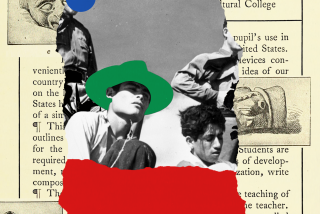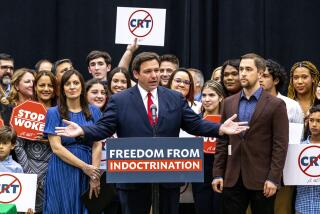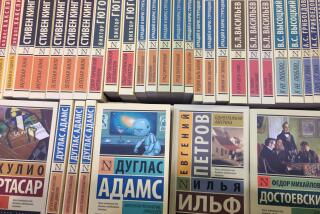Roiling Soviet History
- Share via
It helps to have some questions when you are groping for answers. In the Soviet Union, which is struggling to distinguish facts from the party folklore of its 70 years under communism, that is not an easy combination to put together. So 53 million Soviet students got no final history examination this year because the shortage of questions is almost as severe as the shortage of answers about Soviet life and leadership since the revolution of 1917.
It may help to think of the difficulties that Soviet history teachers are laboring under in the following way: Imagine how teachers in this country would react to revelations that Woodrow Wilson was addicted to arriving secretly at secret covenants and Winston Churchill was a German spy. Imagine how the teachers would react if they knew that there was more--much more.
The root of the Soviet school dilemma is that what is in the newspapers and what Soviet General Secretary Mikhail S. Gorbachev is saying on television bear no important relation to what is in the history books. And skipping one year’s history test is in many ways the least important manifestation of the way that kind of intellectual and literary turmoil is affecting all of Soviet society.
The most fundamental accommodation for the history books so far is the re-creation of hero Josef V. Stalin as a tyrant who turned the revolution that he inherited from V. I. Lenin into a bloodbath. The West had known about Stalin for decades. Many Soviets did, too, but they could neither write nor talk about it openly until now. At another level, the books must accommodate the party’s lifting of men like Nicolai I. Bukharin, once regarded by Lenin as his possible successor, out of the shadows of history. Stalin ordered him shot as a traitor.
The rehabilitation of Stalin’s victims continues apace, with four more cleared this week of the accusations that Stalin made against them. Among them were Lev B. Kamenev and Grigory E. Zinoviev, who shared power with Stalin after Lenin’s death until he nudged both men down the leadership ladder, finally ordering them shot in the 1930s.
It was even suggested in print in Moscow recently that Lenin himself made possible the use of terror as a tool of leadership in the Soviet Union because he did not stop it at the outset.
That in turn has led Soviet analysts, again in print, to question whether there is some congenital flaw in Marxism as practiced by Lenin and his successors that invites terror and dictatorship.
None of this could have happened without the policy of glasnost --sometimes translatable as plain talk --that Gorbachev has promoted as a means of getting ordinary Soviets involved in his efforts to restore momentum to the nation’s sagging economy.
Gorbachev wants to hack away much of the nation’s bureaucratic superstructure, give away much of the Communist Party’s power over day-to-day operations of government or industry, and open up the system to more citizen participation. A combination of caution among ordinary people drummed into them during decades of tyranny and fear among bureaucrats of losing power has made his campaign a cliff-hanger for months.
In two weeks the Gorbachev campaign will come to the highest cliff of all, a national party congress--the first of its kind in nearly 50 years--that will give him, or withhold from him, the changes in law and custom that he needs to continue the reforms.
The congress is a test of the lessons of history that cannot be postponed until the new textbooks are written. It is a test that we hope Gorbachev passes, partly because a nation busy with its own domestic problems is less likely to be thinking in terms of conquest and partly because the Soviet people deserve whatever freedoms they can get--perhaps as a first step toward what the West would recognize as freedoms.
More to Read
Sign up for our Book Club newsletter
Get the latest news, events and more from the Los Angeles Times Book Club, and help us get L.A. reading and talking.
You may occasionally receive promotional content from the Los Angeles Times.









